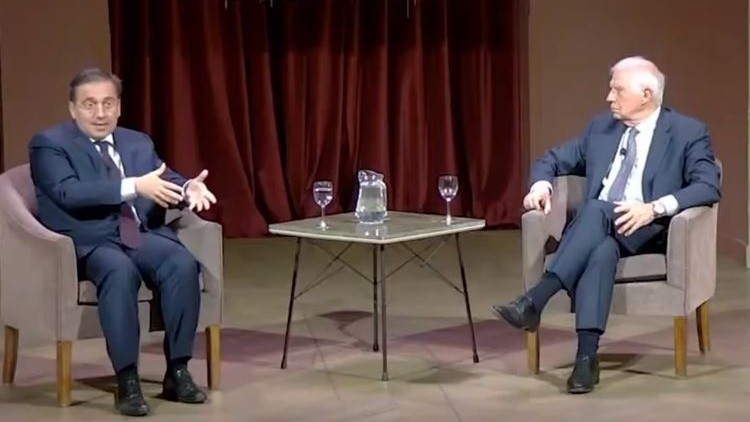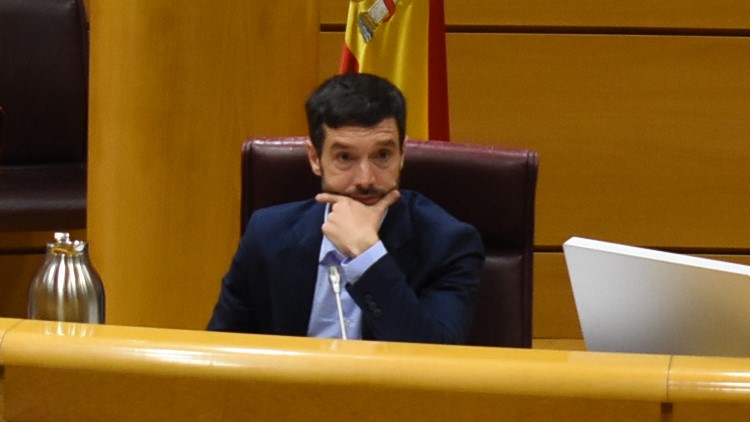The Diplomat
The Minister of Foreign Affairs, José Manuel Albares, and the high representative of the EU for Foreign Policy, Josep Borrell, warned yesterday, during an event at the Ateneo de Madrid to celebrate the Europe Day, against the possible approach of the European People’s Party (EPP), including its candidate and current President of the Commission, Ursula Von der Leyen, to the far-right after the European elections on June 9.
Albares and Borrell held a meeting yesterday at the Ateneo de Madrid to address community challenges in the next legislature. The event took place on the occasion of Europe Day, which commemorates the Schuman Declaration in 1950, which gave rise to the European Union as it is known today.
During the meeting, Josep Borrell admitted that the European Union “has not done everything that needed to be done” in the conflict between Russia and Ukraine, because “more must be done,” and criticized the foreign policy of former US president Barack Obama, who “did nothing” when Russia crossed “several red lines” in Syria and Crimea in 2014. For his part, Albares stated that it is “a one-man war” and that “the values of Shuman’s declaration They are threatened” because of it.
Borrell also acknowledged that, in the conflict between Israel and Hamas, there was not as much unity in the EU as in the conflict between Russia and Ukraine, and regretted that “Putin presents himself as the defender of Human Rights in Gaza.” For his part, Albares insisted on the two-state solution as the only path to peace and security in the region and assured, in this sense, that the Spanish Government will recognize Palestine as a State “very soon.” He also warned that the European Union and the United States must “prevent at all costs” Israel’s military operation from extending to the Rafah crossing.
During the meeting, the management of enlargement and the inclusion of new States in the community space were addressed, a “great challenge” that, in Albares’ opinion, “we cannot postpone”, because the EU could not continue functioning with its current dynamics. with “more than 30 members.” In that sense, Borrell warned that enlargement requires a reform of the “institutional architecture” in which “countries like Spain have a leading role.”
Elections and far-right
Albares and Borrell also took advantage of the event to warn of the importance of the upcoming European elections, elections that, in Borrell’s opinion, are “decisive” and that represent “the moment of truth”, especially in view of the polls. that give rise to far-right parties in many countries.
According to the high representative, Europe faces a “democratic clash” with far right-wing formations that represent a “revolution” and that have “the wind in their favor in the polls” thanks to the use of “disinformation.” For this reason, Borrell took off his “cap” as a high representative during the event to express his concern about the words of Ursula Von der Leyen in which she was open to a possible alliance with “that part of the far-right that she considers digestible.” “This certain relativism has turned on many red lights in Europe,” he warned.
For his part, Albares stressed this same concern, although in a more national key. “If we want Europe to continue advancing, the best thing is not to give the European People’s Party the opportunity to make an agreement with the far-right, because there is a part of the party in which it has clearly positioned itself (the leader of the PP, Alberto Núñez) Feijóo, who, if he can, will join the far-right.”
With Enrico Letta
In addition, under the title ‘9 May: an opportunity to look to the future’, the head of Spanish diplomacy held a dialogue, at the headquarters of the Ministry of Foreign Affairs, with Enrico Letta, former Prime Minister of Italy and President of the Jacques Delors Institute, who has drawn up the report that bears his name on the state of the Single Market in the European Union.
During the colloquium, the minister recalled the Schuman Declaration of 74 years ago and highlighted the values of Europe, “clearly challenged,” he said, “not only from outside Europe, but also from within European societies”.







